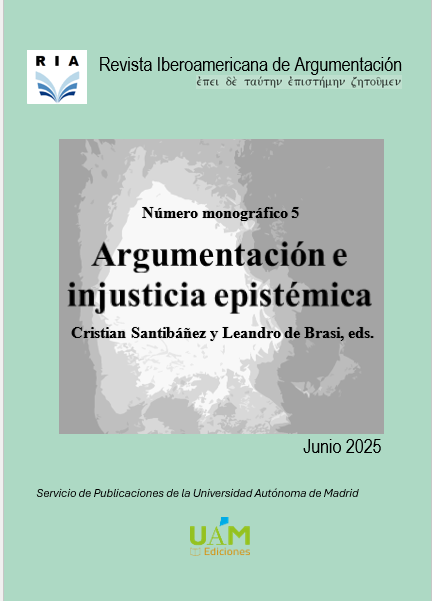Palavras-chave:
argumentation, beliefs, epistemology, epistemic injustice, SimionCopyright (c) 2025 Bondy Patrick

Este trabalho está licenciado sob uma licença Creative Commons Attribution-NonCommercial-NoDerivatives 4.0 International License.
Resumo
This paper introduces a problem relating to hermeneutical injustice that is grounded in epistemic basing failure. Mona Simion has recently argued for an extension of Miranda Fricker’s concept of hermeneutical injustice, to cover cases where subjects have good reasons for important beliefs available to them, but they fail to form the relevant beliefs. This paper further argues that hermeneutical injustices can arise in cases where subjects have good reasons available, and they do hold the relevant beliefs that are supported by those reasons, but they fail to hold their beliefs on the basis of the good reasons that are available to them.
Downloads
Referências
REFERENCES
Almassi, B. (2018). Epistemic Injustice and its Amelioration: Toward Restorative Epistemic Justice. Social Philosophy Today 34: 95–113.
Audi, R. (1986). Belief, Reason, and Inference. Philosophical Topics 14 (1): 27–65.
Bondy, P. (2010). Argumentative Injustice. Informal Logic 30 (3): 263–278.
Bondy, P. (2016). Counterfactuals and Epistemic Basing Relations. Pacific Philosophical Quarterly 97 (4): 542–569.
Carter, A. & Bondy,P. (2018). The Basing Relation and the Impossibility of the Debasing Demon. American Philosophical Quarterly 55 (3): 203–215.
Carter, A. & Bondy, P. (2020). The Superstitious Lawyer’s Inference. In Carter, J. Adam, and Patrick Bondy (eds.), Well-Founded Belief: New Essays on the Epistemic Basing Relation, 125-140. New York: Routledge.
Dotson, K. (2011). Tracking Epistemic Violence, Tracking Patterns of Silencing. Hypatia 26 (2): 236–257.
Evans, I. (2013). The Problem of the Basing Relation. Synthese 190: 2943–2957.
Falbo, A. (2022). Hermeneutical Injustice: Distortion and Conceptual Aptness. Hypatia 37: 343–363.
Fricker, M. (2007). Epistemic Injustice: Power and the Ethics of Knowing. Oxford: Oxford University Press, 2007.
Hookway, C. (2010). Some Varieties of Epistemic Injustice: Reflections on Fricker. Episteme 7 (2): 151–163.
Henning, T. (2021). “Don’t Let Your Mouth”: On Argumentative Smothering Within Academia. Topoi 40: 913–924.
Lehrer, K. (1971). How Reasons Give Us Knowledge, or the Case of the Gypsy Lawyer. The Journal of Philosophy 68 (10): 311–313.
McKinnon, R. (2016). Epistemic Injustice. Philosophy Compass 11 (8): 437–446.
Plantinga, A. (1993). Warrant: The Current Debate. Oxford University Press.
Pohlhaus, G. Jr. (2012). Relational Knowing and Epistemic Injustice: Toward a Theory of Willful Hermeneutical Ignorance.’ Hypatia 27 (4): 715–735.
Simion, M. (2020). Hermeneutical Injustice as Basing Failure. In Carter, J. Adam, and Patrick Bondy (eds.), Well-Founded Belief: New Essays on the Epistemic Basing Relation, 177-189. Nueva York: Routledge.
Ye, R. (2020). A Doxastic-Causal Theory of Epistemic Basing. In Carter, J. Adam, and Patrick Bondy (eds.), Well-Founded Belief: New Essays on the Epistemic Basing Relation, 15-33. Nueva York: Routledge.
